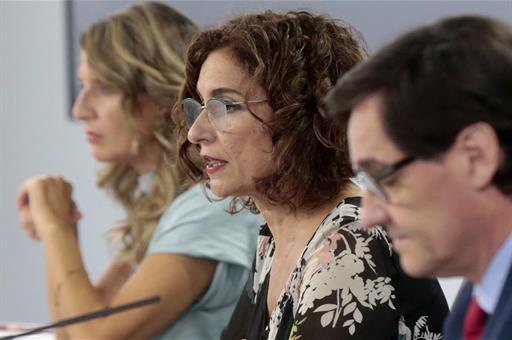Moncloa Palace, Madrid
The Council of Ministers approved the Royal Decree-Law to regulate working remotely, which is defined as work that is done in a three-month reference period, during a minimum 30% of the working day and the equivalent proportional percentage according to the duration of the employment contract.
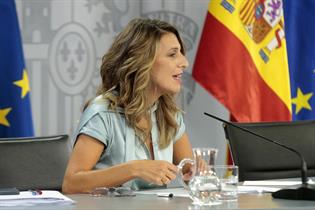 Foto: Pool Moncloa/JM CuadradoThe Minister for Work and Social Economy, Yolanda Díaz, claimed that this new legislation will amount to a paradigm shift in labour relations in our country and in productive methodology. "This is a genuine modernisation process and places us at the forefront of European legislation".
Foto: Pool Moncloa/JM CuadradoThe Minister for Work and Social Economy, Yolanda Díaz, claimed that this new legislation will amount to a paradigm shift in labour relations in our country and in productive methodology. "This is a genuine modernisation process and places us at the forefront of European legislation".
Yolanda Díaz acknowledged that there was a legal loophole on this matter, since the only reference to working remotely was contained in Article 13 of the Workers' Statute. The minister stated that, despite this, and not meeting the necessary conditions, more than 3 million workers have been working remotely during the pandemic, showing that this form of employment increases productivity "and will also undoubtedly increase the competitiveness of the Spanish economy".
The minister thanked the social stakeholders for their involvement in negotiations to agree this new regulation and their contributions to a question that is "technically complex".
Voluntary nature and right to disconnect
Yolanda Díaz explained that working remotely will be of a voluntary nature. This form of work cannot be imposed by either the business owner or the worker, and any agreement reached in this regard may be reversed.
The minister highlighted that this exercise in reversibility, and a refusal to work remotely and difficulties in the correct performance of the activity of working remotely - exclusively related to a change in the provision of services in situ to another form that includes working remotely - may not justify the termination of the employment relationship or a substantial modification in working conditions.
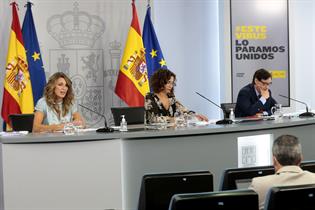 Foto: Pool Moncloa/JM CuadradoExpenses related to the performance of remote work - equipment, tools, resources and consumables - will be for the cost of the company. The place chosen to work remotely need not necessarily be the domicile of the worker, and rights to disconnect will be guaranteed. "The agreement that governs the employment relationship will establish availability times and the rights to a timetable register and work/life balance", explained Yolanda Díaz.
Foto: Pool Moncloa/JM CuadradoExpenses related to the performance of remote work - equipment, tools, resources and consumables - will be for the cost of the company. The place chosen to work remotely need not necessarily be the domicile of the worker, and rights to disconnect will be guaranteed. "The agreement that governs the employment relationship will establish availability times and the rights to a timetable register and work/life balance", explained Yolanda Díaz.
The minister stated that employment rights will be the same whether working in situ or remotely - training, promotion, occupational risk prevention and workplace or sexual harassment, among others - and that the mechanism for collective representation will adapt to the new digital reality.
The new legislation provides for a period of 20 days following its entry into force so that companies can adapt the new conditions to their organisational uses.
The Royal Decree-Law also provides for an extension to the "MeCuida Plan" until 31 January 2021.
Remotely working for public authorities
For her part, the Minister for the Treasury and Government Spokesperson, María Jesús Montero, announced that the Council of Ministers will shortly approve the regulation on working remotely for the more than 3 million public employees of the different authorities, after having agreed the terms and conditions at the Public Administration Sector Conference and the General Collective Bargaining Board of the Public Authorities.
Simplification of bureaucracy for Minimum Living Income
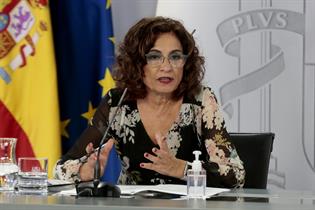 Foto: Pool Moncloa/JM CuadradoThe government agreed to the amendment of Royal Decree 20/2020, establishing a Minimum Living Income (MLI) to speed up the processing and concession of this benefit.
Foto: Pool Moncloa/JM CuadradoThe government agreed to the amendment of Royal Decree 20/2020, establishing a Minimum Living Income (MLI) to speed up the processing and concession of this benefit.
One of the measures is the elimination of the previous requirement for registration for job seekers at public employment services. "It will be an a posteriori obligation that can be complied with in the six months following the recognition of the benefit", said María Jesús Montero.
Documentation that needs to be provided by applicants has also been eliminated, which will be obtained from the authorities by crossing-checking data on the census, and special provision will be given to current beneficiaries of minimum income from regional governments to become beneficiaries of the MLI.
The Government Spokesperson continued by saying that the term for resolving applications will be extended to six months and all those applications received to date are guaranteed to be processed. Both these and those presented before the end of the year will have retroactive economic effects dated back to 1 June, in the event that all the requirements were met at that date.
2nd National Adaptation to Climate Change Plan
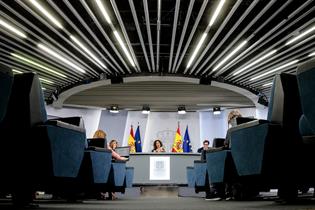 Foto: Pool Moncloa/JM CuadradoThe Council of Ministers approved the 2nd National Adaptation to Climate Change Plan (Spanish acronym: PNACC) 2021-2030 - one of the commitments contained in the Government Declaration on the climate and environmental emergency on 21 January.
Foto: Pool Moncloa/JM CuadradoThe Council of Ministers approved the 2nd National Adaptation to Climate Change Plan (Spanish acronym: PNACC) 2021-2030 - one of the commitments contained in the Government Declaration on the climate and environmental emergency on 21 January.
The aims of the Plan are "to build a less vulnerable, safer and more resilient country to the impacts and risks of climate change, that is capable of anticipating, responding and adapting to a changing climate context", said the Government Spokesperson.
Specifically, the Plan contains 81 lines of action organised in 18 work areas, such as human health, water and water resources, natural heritage, bio-diversity and protected areas, coasts and the marine environment, forestry protection, the fight against desertification, crop and livestock farming and food security.
Grants for contracts for pre-doctoral researchers
The government authorised the State Research Agency to implement a round of proposals, within the framework of the State Programme to Promote Talent and their Employability, up to 1,101 grants for pre-doctoral contracts, for a sum in excess of 108 million euros.
These grants will be for four years and are designed so that pre-doctoral researchers can complete their doctoral theses or research projects in groups with a proven scientific and academic track-record that belong to universities and public research bodies and other research centres.
María Jesús Montero claimed that boosting science "is essential to exit this situation of the health pandemic and continue attaining quotas of added value and innovation in our productive fabric".
Institutional statements
The government approved an institutional statement on the occasion of the International Day against Sexual Exploitation and Trafficking of Women and Children, held on 23 September, and an institutional statement to reiterate the government's commitment to the goals of the 2020 Agenda on the fifth anniversary of its approval on 25 September 2015 by the General Assembly of the United Nations.
María Jesús Montero stressed that the eradication of sexual exploitation and human trafficking, which particularly affects women - 80% of the victims - is a priority task for the government.
COVID-19 Group for Region of Madrid
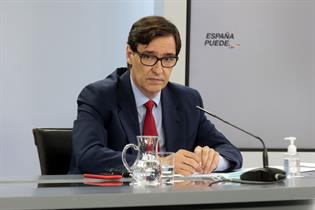 Foto: Pool Moncloa/JM CuadradoThe Minister for Health, Salvador Illa, mentioned the agreement reached on Monday, following the meeting between the President of the Government, Pedro Sánchez, and the President of the Regional Government of Madrid, Isabel Díaz Ayuso, to set up a forum for cooperation that allows specific measures to be taken to halt the spread of COVID-19 in this autonomous region.
Foto: Pool Moncloa/JM CuadradoThe Minister for Health, Salvador Illa, mentioned the agreement reached on Monday, following the meeting between the President of the Government, Pedro Sánchez, and the President of the Regional Government of Madrid, Isabel Díaz Ayuso, to set up a forum for cooperation that allows specific measures to be taken to halt the spread of COVID-19 in this autonomous region.
Salvador Illa argued that the meeting was "very positive regarding taking decisive action and recovering control", and framed it within the "constant, permanent and fluid relationship" that the government maintains with regional governments in managing the pandemic.
The minister explained that the first work meeting of the COVID-19 Group, set up to this end, was held on Monday, with the participation of the Minister for Territorial Policy and Public Function, Carolina Darias, the Vice-President of the Regional Government of Madrid, Ignacio Aguado, and the Regional Health Councillor, Enrique Ruiz Escudero.
Salvador Illa stated that this Group has two technical support units, which have also started to meet, and which will have a single technical spokesperson, yet to be appointed.
Current affairs
The Government Spokesperson announced that the President of the Government, Pedro Sánchez, will travel to Brussels on Wednesday, to hold bilateral meetings prior to the extraordinary meeting of the European Council, to be held on Thursday and Friday. This Council meeting, announced María Jesús Montero, will address such issues as relations between the European Union and Turkey and China, the internal market and the digital agenda.
María Jesús Montero stated that the resources that will be received from Europe for the recovery from the socio-economic consequences of COVID-19 (Next Generation EU) must be harnessed through the National Budget, updated and adapted to the current economic reality.
"We need to come out of this budget deadlock we have been in for two years", she declared, and called on all political forces to help approve the new public accounts.
Non official translation





